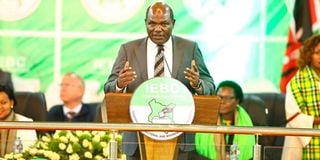Mutuma Mathiu: Hold tight, professionals in control

Independent Electoral and Boundaries Commission (IEBC) Chairman Wafula Chebukati during a Press briefing at the Bomas of Kenya on August 10, 2022.
What you need to know:
- Why did the media not set up a shared tallying system? Because we probably did not work hard enough to overcome competitive pressures and build trust.
- Tallying is not just a question of adding up figures. It comes with a major security exposure for staff, equipment, premises and reputation.
- We are not just tallying figures; we are also trying to keep safe, and open, not bankrupt ourselves, stay out of the clutches of influence groups and provide good, clean data.
I am seated at my desk, sleep-deprived, exhausted and stressed (this is the normal state for a journalist, however).
On Wednesday night, at 1.02 am, we took a few hours’ break from tallying the presidential election results.
The teams were exhausted, the risk of errors was rising, we had strangers in the building in the middle of the night, the streets were dark and deserted, and there were probably only a few insomniacs following the count on TV and online.
So the question arose: You finish the count at 4 am, when the world is still asleep, possibly exposing the data to the risk of errors and the operation to vulnerabilities, then what?
If you have fundis on site, it’s very easy to do many small things. But once they leave, bringing them back is always a bugger.
Crucial fundis will not show up, others will come late, the foreman is drunk, something happened to the wheelbarrow, the paint is rock solid—mobilisation is most times a slow, painful process.
So, the speed with which we mobilised for the count was slow yesterday, giving rise to a whole raft of conspiracy theories and complaints.
In this tallying business, I think we took a carthorse to the races. Many commentators have spoken of “ill-prepared” media at length.
''Dirty secrets"
I’ll let you in on the dirty secrets. Media houses built systems to physically collect and tally Forms 34B—that is 292 forms from constituencies—and not Forms 34A, from 46,229 polling stations.
I am one of those who initially advocated tallying at the polling station and building a system to audit the Independent Electoral and Boundaries Commission’s (IEBC) tally.
I also believed that the way to do this was to partner with organisations which had some capacity and experience in mass mobilisation and logistics.
But to achieve that, it required 92,458 agents, at least two for a polling station, for two days. This is quite expensive, but that is not the principal issue.
You need to build a bureaucracy to manage a group of more than 150 people; for 100,000, you need a humongous structure to ensure the productivity and integrity of the data coming into your system.
This is a costly business mainly done as a service without the expectation of much of a financial return.
It was assumed at the beginning that media houses would have to collect their own data; nobody expected IEBC to open the server, which it had promised numerous times in the past but never quite got round to doing.
Therefore, the cost of recruitment, training and deployment of agents was factored into the thinking. As it turned out, this was unnecessary.
Many of us were pleasantly surprised when IEBC provided a link—which actually worked. But we had invested our money in data collection agents and not data entry clerks.
People have remarked that the slow pace of tallying was because of a lack of capacity as a result of poor planning and unpreparedness, or an inability to manage what are essentially rudimentary processes.
The truth (if anybody is interested in that type of thing anymore) is that any of the big media houses can deploy 200 clerks, provide them with computers and sitting space and build the simple software required to tally and display election results efficiently, with high degrees of integrity.
Different positions
Why did the media not set up a shared tallying system? Because we probably did not work hard enough to overcome competitive pressures and build trust.
Keep in mind that media occupy different positions in relation to political interests.
There are those that support candidates, there are those that are owned by candidates, there are those trying to remain independent of political interests and so on.
And then there are interests looking for an opportunity to influence media by providing finances for all manner of activities.
And whereas media are eager to cooperate and work with IEBC, they are also very keen to remain independent operationally and financially of that institution.
It’s possible to build a collective tallying system but it will take more time and more structured engagement than there was this time round.
Tallying is not just a question of adding up figures. It comes with a major security exposure for staff, equipment, premises and reputation.
Institutions have to protect themselves against physical attacks and hacking.
Two media organisations were reportedly hacked yesterday; one had its systems attacked and the other, apparently, had its data contaminated.
Secondly, reputation, our stock in trade, depends on the accuracy and integrity of the data.
That means the quality control processes put in place will many times over slow progress and push up costs. But it must be done.
In terms of physical risk, Kenyan elections are not kindergarten play. People, including election officials, have been harmed because of political competition.
So these Danubes of thought opining on Twitter and in WhatsApp groups about our alleged incompetence and unpreparedness should give us a break.
We are not just tallying figures; we are also trying to keep safe, and open, not bankrupt ourselves, stay out of the clutches of influence groups and provide good, clean data. Hold tight.





